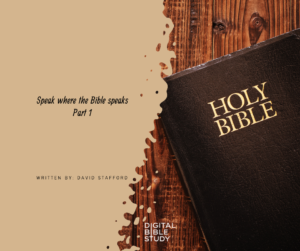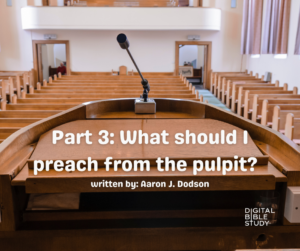Jim Taylor
I know that you’re skeptical already. In a world where personal choice is king, how could we possibly limit ourselves to just one option? However, if that one option is the only God-given option, wouldn’t it make that one choice, the idea that there might only be one church, worth exploring?
Let’s begin by looking at Acts 2:41, 47. Verse 41 reads, “So those who received his words were baptized, and there were added that day about 3,000 souls.” Verse 47 says, “And the Lord added to the church daily those who were being saved.” These people believed Peter’s words when he said that they had crucified the Son of God. Upon believing, they asked, “What do we need to do?” Peter replied, “Repent and be baptized…” Because they believed Peter’s message, they followed his instructions; they did repent, and they were baptized. Immediately after, verse 47 says they were “being saved.” Belief, repentance, and baptism resulted in the Lord simultaneously adding them to the church. Now, here’s my question, “Which church?” Which church were they added to? Was it your church? This is a serious question.
Right now, there are some 750 different religious groups claiming to be the “right” church or at least to be one of many “right” churches. That sounds confusing to me. Since the Bible says, “God is not the author of confusion,” in I Corinthians 14:33, then it seems to me that 750 conflicting groups cannot be God’s plan. One church, one unified group, sounds like a non-confusing plan.
Is it possible that there really is just one church, just one group? Look at Matthew 16:18. Jesus said, “I will build MY church” (emphasis mine). Ephesians 4:4 says there is “one body.” Ephesians 1:22 & 23 says that one body equals the one church. Colossians 1:24 says the same thing. Finally, look at I Corinthians 12:13. It says, they “were all baptized into one body.” Let’s put all of this information together:
- Ephesians 4:4 – There is one body.
- I Corinthians 12:13 – We were all baptized into that one body.
- Ephesians 1:22 & 23 – That one body equals the church.
- Colossians 1:24 – That one body equals the church.
Jesus said, “I will build my church.” Singular. One body equals one church, and one church equals one body, the one that Jesus said would belong to Him. Simple, not confusing.
What Is A Denomination?
So, what about those 750-plus groups? Usually, in the United States, we call these different religious groups “denominations.” What is a denomination? And in what Biblical way do they relate to this one church mentioned so often in the New Testament?
A Denomination is One Among Many Similar Things – The Church is Unique
One answer might be that the one body/one church spoken of in the New Testament is a denomination, but that would be a contradiction in terms. The very word, “denomination,” requires that it be used to describe one of many, not just a single item. There are two ways to use the word “denomination.” The first way is to “denominate” similar things, whereby they are somehow differentiated from each other. For example, consider denominations of money. All bills are paper currency, but they are distinguishable from one another by the name printed on them. There are $1 bills, $2 bills, $5 bills, $10 bills, and so on. Each of these bills represents different denominations of money because they have different names associated with them, giving them different values.
Question: Did Christ give His church a distinguishing, or denominating, name? No! In Matthew 16:18 He simply called it His. He said, “I will build my church….” That’s a description, not a name. This one church has many different descriptions in the Bible. For instance, “church of God” is used to describe it seven times: Acts 20:28, I Cor. 1:2; 10:32; 11:22; and 15:9. In Romans 16:16, we read about “the churches of Christ.” Again, this is not the name of these churches; it is a description. Ownership is being established. These churches belong to God; they belong to Christ. In the New Testament, the church that Jesus says He will build isn’t given a name. It is simply the church that belongs to Him. It is Christ’s church.
At the building where we gather to worship, there is a sign out on the street. It reads, “The church of Christ in Katy.” But that’s not the NAME of the church that I belong to. Even though I know better, I have to remind myself of that fact. I “belong” to the church that Christ added me to on the day that I was saved. The building where I meet has a sign that I and everyone else should always remember is just a description of the group of people meeting and worshipping inside the building. We, as a group, are members of the church that Jesus built, and we meet together in Katy. Hence, “The church of Christ in Katy”. The church we read of in the Bible has no official name given to it. It has not been denominated in that way.
A Denomination is One Part of the Whole – The Church is the Whole
The second way to denominate something may be illustrated by looking at the bottom part of fraction, known as the denominator. Let me be practical here. Throughout the centuries people have said “There is one church, and our denomination is part of it.” Previously, I stated there were some 750 different groups claiming to be part of the one church or body. Mathematically speaking, one of these groups would be expressed as 1/750. In other words, the one body is being divided into 750 pieces. Now let me repeat my earlier question about Acts 2:47. To which one of these 750 churches does the Lord add you to when you believe, repent, and are baptized? The Baptist Church? The United Methodist Church? The Lutheran Church? The Episcopal Church? The Church of Jesus Christ of the Latter Day Saints? Jehovah’s Witnesses? And on and on we could go. The answer is “none of them.” The Bible says the Lord adds you to His church!
Look at 1 Corinthians 1:10. It reads, “I beg you, brothers, by the name of our Lord Jesus Christ, that you speak the same thing, and that there be no divisions among you, but that you be perfectly united in the same mind and in the same judgment.” No DIVISIONS means no denominations. John 17:21&22 says, “that they all be one, as You, Father, are in me, and I in You, that they also may be one in us, that the world might believe that You sent me.”
Look around. Does that sound anything like the smorgasbord of churches you see on street corner after street corner? It’s one of the biggest lies Satan has working for him. All these different groups and denominations truly believe that they are part of the one true church, even though they teach totally different doctrines and have such a wide diversity in their creeds. Let’s reason together for a moment. That would be like ordering a chocolate pie, but when you start cutting it into slices, or denominating it, so to speak, one slice is strawberry, another banana, another coconut cream, and so on. What if those pie slices could talk? You know what they would say? “We are part of the chocolate pie!” Really? I believe if everyone would stand back and truly look at this picture, we would all realize there is something terribly wrong with it.
Does the Bible Support Denominationalism?
One problem is that many people try using certain passages as proof texts to support having all these various groups and churches, and they end up taking those passages out of context.
Let’s look at two examples which are often used to “prove” that the Bible teaches the acceptance of many, many different churches. First, look at John 15:5, 6. Together it reads “I am the vine. You are the branches……If anyone does not abide in me; he is cast out as a branch, and withers. Such branches are gathered, thrown into the fire, and burned.” Many believe this passage teaches that Jesus is the vine, and all the different churches are the branches; however, that is not what it says. He was not speaking to a lot of different denominations or churches. He was talking to individuals. These individuals were called upon to bear fruit. Jesus is saying that if they don’t bear fruit, they will end up being cut off and thrown into the fire. It’s dangerous to try and make this verse say something that it doesn’t say. We should never try to force scripture to conform to our beliefs and biases, but rather we should conform our beliefs to scripture.
The second example is found in Romans 11:17-18. This verse is also oft used in trying to “prove” a multiplicity of churches as well. It reads “If some of the branches have been broken off, and if you, a wild olive tree, have been grafted in, and have become a partaker of the root and of the fatness of the olive tree, do not boast against the branches. If you boast, remember that you do not support the root, but the root supports you.” Again, many people say that Jesus is the root, the olive tree, and all these various churches have been grafted in to be a partaker. But it does not say that. Again, to whom is he speaking? Who is the “wild olive tree?” Verse 13 says, “I’m speaking to the Gentiles.” He is not speaking to a vast crowd made up of many different religious groups. He was speaking to Gentiles. This grafting process that Paul talks about here in Romans 11 is further explored in Ephesians 2:12-14. It says, “At that time you [Gentiles] were without Christ, alienated from the commonwealth of Israel, and strangers to the covenants of promise, without hope and without God in the world. But in Christ Jesus, you who were at one time far away have now been made near [grafted in] by the blood of Christ. He himself is our peace. He has made both [Jews and Gentiles] one, and by his flesh he broke down the separating wall, the hostility.” The terms “grafting,” “made near,” and “breaking down the separating wall” are all describing the same event. That is the “mystery of Christ” found in Ephesians 3:4 & 6. Verse 6 says, “that the Gentiles should be fellow-heirs, members of the same body, and sharers together of the promise in Christ Jesus through the gospel.”
Paul is not saying that Jesus is the olive tree and all these religious groups, churches, and denominations that we see surrounding us today have been grafted in and are now partakers. Paul is harkening back to the events of Acts 10, when Peter preached the gospel to Cornelius and his household. These Gentiles heard the good news, turned to God, were baptized into Christ, and were now “grafted in” to the church, the one Jesus had told Peter he would build.
These verses do not support the plethora of churches we see today. Look at Corinthians 1:12 & 13. Paul is speaking to people in Corinth who have been added to the one true church. They have a problem. It appears that various members of the church that meets together in that location are trying to form different denominations, or groups. The passage reads, “I am saying this, that one of you is declaring, ‘I, indeed, am of Paul;’ while another is saying, ‘I am of Apollos;’ yet another says, ‘I am of Cephas;’ and another says, ‘I am of Christ.’ Is Christ divided? Was Paul crucified for you, or were you baptized in Paul’s name?” Paul is, of course, asking rhetorical questions. No, Christ is not divided. No, they were not baptized in the name of Paul. They were baptized in the name of Jesus Christ, and they were to be “of Christ” only.
Conclusion
In closing, we must accept the fact that the one, true church is not divided. It is non-denominational. It does not wear the name of any man. The Bible is its only creed. It follows the pattern described in the New Testament in both organization and worship. You don’t join it. You obey the Gospel of Christ, just as it was preached in the first century, and God adds you to it. If your church does not sound like this, I encourage you to study the book of Acts. In Acts chapter two, we have the history of the very day the church began in Jerusalem, on the Day of Pentecost. Throughout the entire book of Acts, we read of many people who heard the message of Christ and decided to obey. Every conversion that we read about shares something in common. Every conversion recorded for us in the book of Acts culminates in baptism, and at that point, the Lord added them to his church. If we follow the same pattern, we can expect the same results. Christ will add us to his church. That makes us Christians, nothing more and nothing less. No qualifiers or modifiers needed, just Christians. I don’t want to be anything else. What about you?

Are We Speaking Where the Bible Speaks? Part 1
There is an important question that needs to be addressed, and that question is “Are we speaking where the Bible speaks?”

Part 3: What Should I preach from the pulpit
Dear preacher, don’t allow others to prevent you from teaching the whole counsel of God!

What is the Church?
Progressives have successfully shifted our language. We have ceded ground to them they do not own. Their efforts have created enough ambiguity and fluidity around the nature of the church that many no longer believe in the concept of a non-denominational church of Christ. The surest path back is to reclaim the language. The definition of the “church” is as fixed as the definition of a “woman.”

